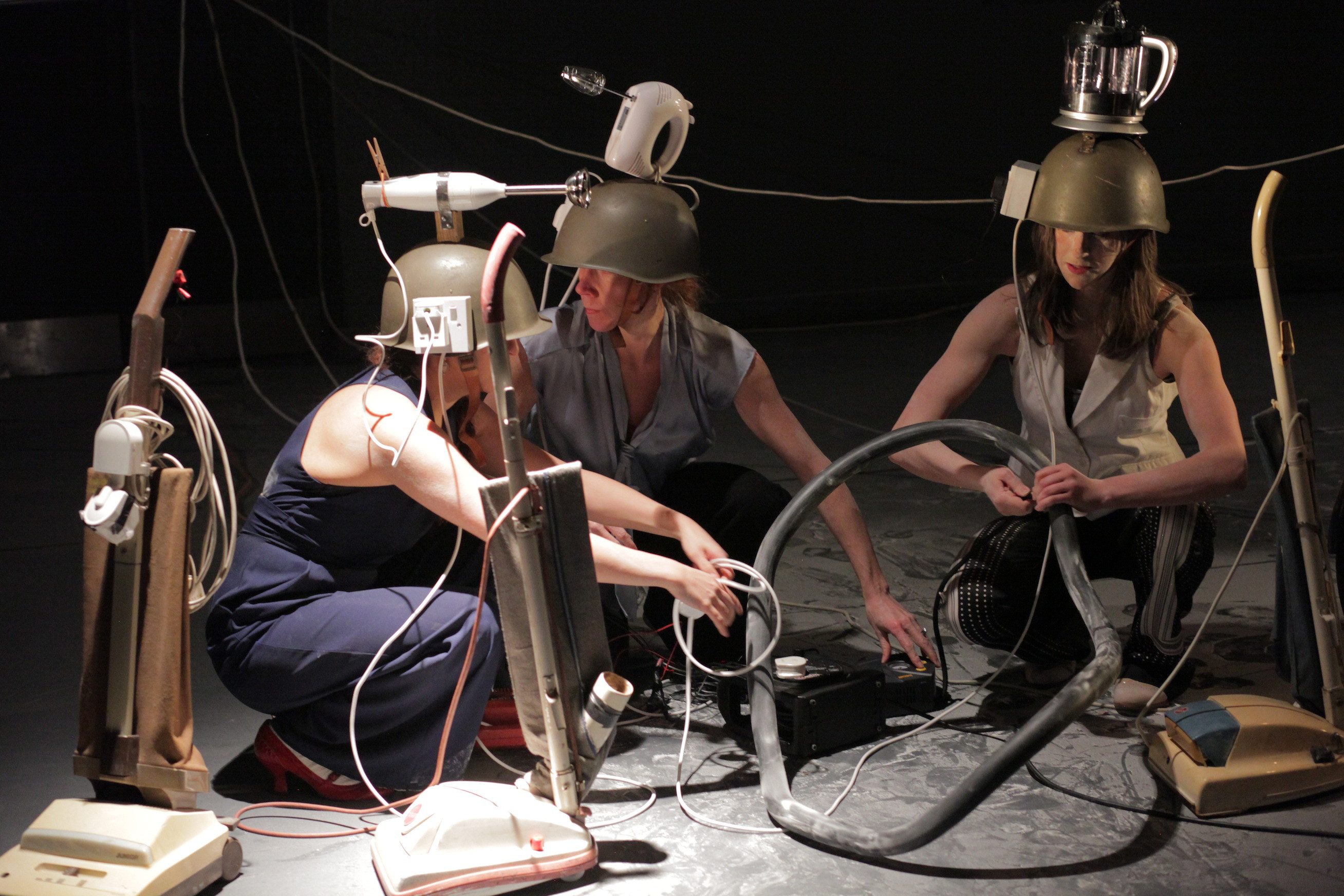Everyday objects. Upright Hoovers, lots, dotted around the performance space. A ladies’ bike. A radiator. Electrical appliances. Extension leads. Marigold gloves. An ironing board. A flat-screen TV. The domestic environment.
We hear a male voice on the soundtrack, mixed low – it’s hard to hear what’s being said. I pick up something about having to change the sheets. Three women enter the space. There’s a short choreography with the Hoovers. The women voice the words of a domestic argument. It only takes a moment to realise that the male voice on the soundtrack is voicing a woman’s concerns, and the women’s live voices are voicing a man’s side of the argument. A nice twist.
The show isn’t what it first appears to be. It isn’t a show about domestic labour, the drudgery of housework (although that is part of the narrative); it’s a study in love – the subtitle of the piece turns out to be the important bit. And a study in gender (a popular 30 Bird theme – see, for example, Plastic, a show about trans-gender in Iran, shortlisted for a Total Theatre Award a few years ago).
Bit by bit, the fragmented narrative builds into a cohesive whole, using repetition and revision and addition so that layers are added, granting us ever more insight into the story of a marriage. A marriage between an Iranian man and an English woman, in which she is asked to make a declaration of her belief in Allah in order for the wedding to go ahead (‘Is she Catholic’, asks the Imam. ‘Catholics are difficult.’) A marriage in which a child is conceived semi-accidentally due to a half-arsed attitude towards contraception (the story of so many marriages), but then welcomed and raised with love. A marriage in which one person (the man) is away from home a lot, out in the world because of his work, whilst the other person (the woman) finds herself the one left to do most of the childcare and housework. ‘While you’ve been away I’ve…’ becomes a repeated refrain. Yes, it’s a familiar tale. Universal.
But there’s more, a lot more. The story becomes more specific, more intimate. A story of a romance that blossoms through a Spanish holiday – although one partner mostly remembers niggling things like having to bypass all the lovely fish restaurants because the other one doesn’t like fish. Memories of ex-girlfriends creep in. Parallel stories interweave: we move into the lives of other couples; of parents, and grandparents in Tehran.
A constant theme throughout the show is the ever-changing rules on gender and gender-based expectations that permeate British and Iranian culture. We learn that our male protagonist rides a ladies’ bike, which is a lot faster and better than his old mountain bike, yet courts ridicule. The Tehran grandfather is mocked by the gossips for sewing curtains for his wife and eating quiche. Real men don’t, obviously. We learn of the emancipation of women in Iran: it is decreed that no woman should cover her head, the scarf is abolished, women are ordered to dress in the Western manner. Grandmother refuses to go out naked-headed, so gets around Tehran by climbing from roof to roof with a ladder. It’s an extraordinary image, painted with words.
Meanwhile, on screen, here’s Johnny Guitar: the only Hollywood Western to feature a gunfight between two women. ‘All a man needs in life’ says a cowboy ‘is a cup of coffee and a smoke’. Oh, if only life were so simple…
The show is beautifully scripted (by writer/director Mehrdad Seyf) but looks and feels nothing like a regular ‘play’ – although there’s plenty of play. The words are important, but no more or less than the visual imagery, and the performers’ physical engagement with the installation-like environment. The show is created in collaboration with artist Chris Dobrowolski, and rather than a ‘set’ in the regular sense of the word, we have the real-life domestic objects that are used to create ever-changing sculptural tableaux. The bike often finds itself resting on the radiator. The women are often to be found wearing coffee-pot headdresses. Electrical appliances bang or whirr.
And within the text, whether spoken or on the soundscape, objects continue to hold sway –listed, accounted for. The cupboards and drawers containing her headscarves and long-sleeved tops. The story of how Grandmother wouldn’t remove his toiletries and clothes from the flat after Grandfather died. Live voice and recorded voice work in harmony. The soundtrack is a mix of this recorded text, found sound, and original composition (by Greg Mickelborough). Here and there are whimsical waltzes, distorted rumbas, and a hint of a Spanish Paso Doble.
The piece is performed more than competently with zest and energy by the three women actors, but if there’s a criticism it is that the physical performance is not as edgy or uplifting as it could be – I’d like to see a little more choreographic rigour in the piece. That aside, a stimulating and entertaining additional to 30 Bird’s ongoing investigation of what it means to be ‘male’ or ‘female’ in this world of ours.

